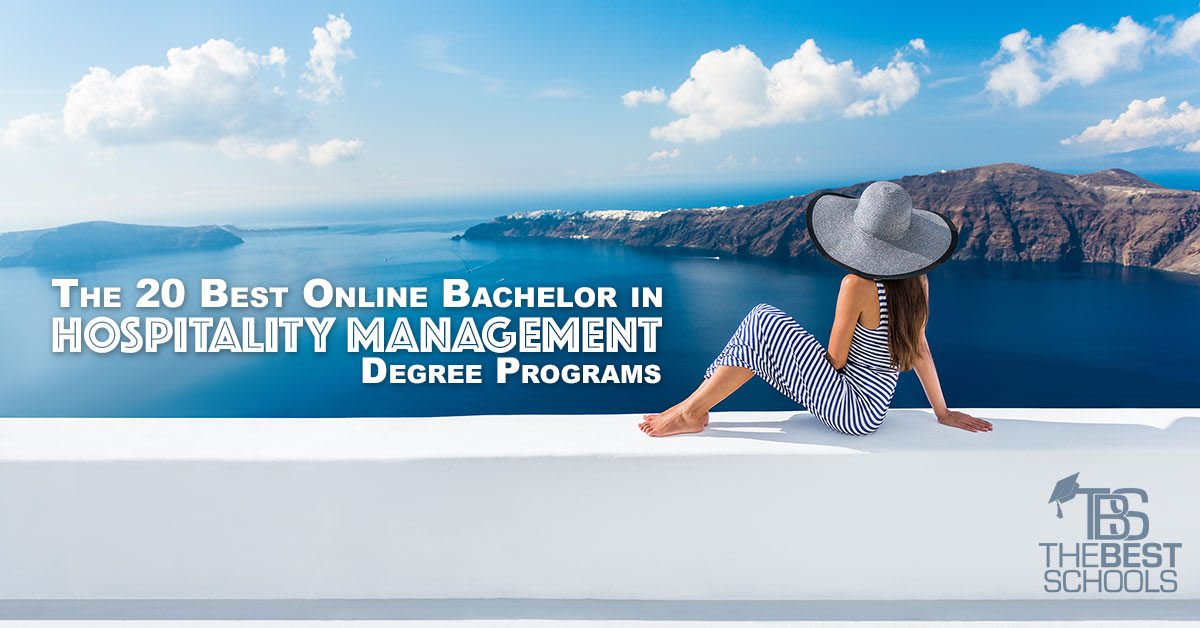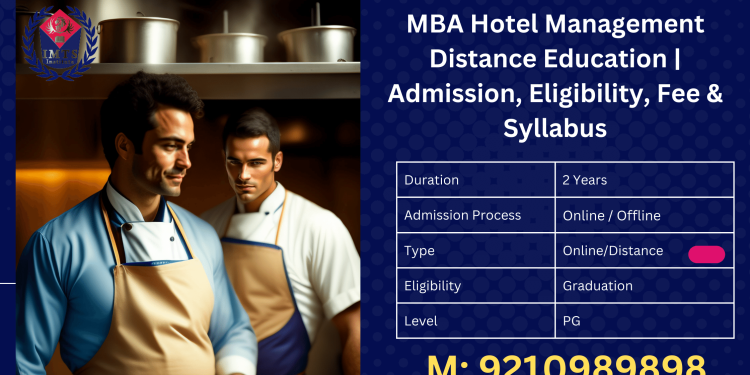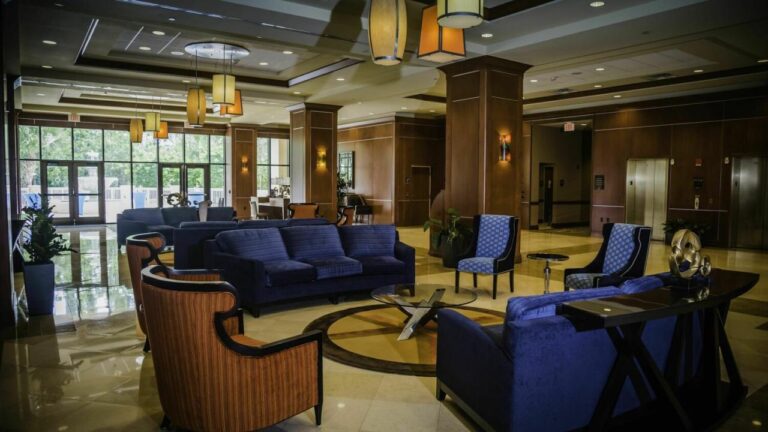MBA Hospitality Online Accredited Programs
MBA hospitality online accredited programs offer a flexible and convenient pathway to a rewarding career in the hospitality industry. These programs provide a rigorous business education tailored to the unique challenges and opportunities of the sector, combining core management principles with specialized hospitality knowledge. This comprehensive approach equips graduates with the skills and expertise needed to excel in various roles, from hotel management and event planning to culinary operations and tourism development.
The accreditation of these programs ensures quality and recognition, enhancing career prospects and professional credibility.
This exploration delves into the key aspects of accredited online MBA hospitality programs, examining accreditation standards, curriculum design, learning experiences, career outcomes, financial considerations, and the application process. We will analyze the benefits of online learning, compare different program offerings, and provide insights to help prospective students make informed decisions. The goal is to provide a clear and comprehensive understanding of this valuable educational pathway.
Accreditation and Recognition
Choosing an online MBA in hospitality requires careful consideration of the program’s accreditation. Accreditation signifies that the program meets specific quality standards, enhancing its credibility and the value of your degree in the job market. Understanding the various accrediting bodies and their standards is crucial for making an informed decision.Accreditation ensures that the program adheres to rigorous academic standards, offering a curriculum that is both relevant and comprehensive.
It also provides assurance to prospective employers that graduates possess the necessary skills and knowledge to succeed in the hospitality industry. The prestige associated with an accredited program can significantly impact your career prospects and earning potential.
Accrediting Bodies for Online MBA Hospitality Programs
Several organizations accredit online MBA programs, each with its own set of criteria and reputation. The choice of accrediting body can significantly influence the program’s standing and the recognition it receives within the industry. Some of the most prominent accrediting bodies include the Accreditation Council for Business Schools and Programs (ACBSP), the Association to Advance Collegiate Schools of Business (AACSB International), and the International Assembly for Collegiate Business Education (IACBE).
Comparison of Accreditation Standards
The AACSB International is widely regarded as the most prestigious accrediting body for business schools globally. Its rigorous standards encompass various aspects, including faculty qualifications, curriculum design, student support services, and institutional resources. AACSB accreditation is a testament to a school’s commitment to excellence and continuous improvement. In contrast, the ACBSP focuses on providing a more accessible accreditation pathway for smaller institutions and programs, while still maintaining high standards.
The IACBE provides a more specialized accreditation for business programs, offering a flexible approach tailored to individual institution’s needs. Each body has its own specific criteria and evaluation process, but all strive to ensure the quality and relevance of the programs they accredit.
Importance of Accreditation for Career Prospects
Accreditation significantly enhances career prospects for graduates of online MBA hospitality programs. Employers often prioritize candidates with degrees from accredited institutions, viewing accreditation as a marker of quality and competence. An accredited degree demonstrates to potential employers that the graduate has completed a rigorous program that meets industry standards, improving their chances of securing desirable positions and potentially leading to higher salaries.
Furthermore, recognition from a reputable accrediting body enhances the credibility of the degree, increasing its value in the global job market.
Top-Ranked Programs: Accreditation, Cost, and Duration
The following table compares several top-ranked online MBA hospitality programs across key criteria:
| Program Name | Accrediting Body | Estimated Cost (USD) | Program Duration (Months) |
|---|---|---|---|
| Example Program 1 | AACSB International | $50,000 – $70,000 | 24 |
| Example Program 2 | ACBSP | $35,000 – $50,000 | 18 |
| Example Program 3 | IACBE | $40,000 – $60,000 | 20 |
Curriculum and Course Structure

An online MBA in hospitality provides a comprehensive curriculum blending core business principles with specialized hospitality management knowledge. This integrated approach equips graduates with the skills and strategic thinking needed to excel in the dynamic hospitality industry. The program structure typically balances theoretical learning with practical application, often incorporating real-world case studies and simulations.The curriculum is designed to be flexible and adaptable to the diverse needs of working professionals.
Courses are delivered asynchronously, allowing students to learn at their own pace and schedule, while still benefiting from instructor interaction and peer collaboration through online forums and discussion boards.
Core Business Courses
Core business courses form the foundation of the MBA program, providing a robust understanding of fundamental business principles applicable across various industries. These courses typically include subjects like financial management, accounting, marketing, operations management, and strategic management. Students will develop skills in financial analysis, budgeting, marketing strategy development, supply chain optimization, and strategic decision-making, all crucial for success in the hospitality sector.
For example, a financial management course might cover topics such as revenue management strategies specific to hotels and restaurants, while a marketing course could delve into digital marketing techniques tailored to the hospitality industry.
Hospitality-Specific Specializations
Beyond the core business courses, students can choose specializations that align with their career goals and interests. These specializations provide in-depth knowledge and expertise in specific areas of the hospitality industry. Common specializations include hotel management, restaurant management, event planning, tourism management, and culinary management. Within these specializations, students explore advanced topics relevant to their chosen area, such as revenue management in hotels, menu engineering in restaurants, or sustainable tourism practices.
The curriculum might include advanced courses in areas like hospitality law, crisis management within hospitality settings, and the ethical considerations of the industry.
Elective Courses
Online MBA in hospitality programs offer a range of elective courses, allowing students to further customize their education and develop expertise in specific areas of interest. Examples of elective courses might include topics such as hospitality technology, international hospitality management, luxury hospitality, entrepreneurship in the hospitality industry, and sustainable and responsible tourism. These electives provide opportunities for deeper exploration of emerging trends and technologies shaping the future of hospitality.
Pedagogical Approaches
Different online programs employ various pedagogical approaches to engage students and foster effective learning. Case studies are frequently used to analyze real-world scenarios and apply theoretical concepts to practical situations. Simulations allow students to experience the challenges and decision-making processes involved in managing hospitality businesses in a risk-free environment. Group projects often involve collaboration with peers, promoting teamwork and communication skills, mirroring real-world workplace dynamics.
Many programs incorporate interactive online discussions, allowing students to share insights, debate ideas, and learn from each other’s experiences. The combination of these approaches aims to create a dynamic and engaging learning experience.
Key Skills and Knowledge Gained
Completing an accredited online MBA in hospitality equips graduates with a valuable skillset and knowledge base.
- Strategic thinking and decision-making in hospitality contexts.
- Financial management and accounting principles specific to hospitality.
- Marketing and sales strategies for hospitality businesses.
- Operations management and optimization techniques in hospitality settings.
- Human resource management in the hospitality industry.
- Understanding of hospitality law and ethics.
- Proficiency in using hospitality technology and management systems.
- Effective communication and teamwork skills.
- Leadership and management skills applicable to hospitality roles.
- Knowledge of sustainable and responsible tourism practices.
Program Delivery and Learning Experience
Online MBA programs in hospitality leverage technology to deliver a flexible and engaging learning experience. Successful programs integrate sophisticated platforms with interactive learning methodologies, ensuring students gain the necessary skills and knowledge despite the lack of a traditional classroom setting. This section will explore the key aspects of program delivery and the overall learning experience.
Online Learning Platforms and Technologies
Top-ranked online MBA hospitality programs typically utilize Learning Management Systems (LMS) such as Blackboard, Canvas, or Moodle. These platforms provide a centralized hub for course materials, assignments, communication tools, and assessments. Beyond the LMS, many programs incorporate video conferencing software (Zoom, Microsoft Teams) for live lectures, group discussions, and virtual office hours. Advanced programs may integrate specialized hospitality software simulations, virtual reality (VR) tours of hotels or restaurants, and data analytics platforms to provide practical, real-world applications of learned concepts.
For example, a program might use a virtual hotel management simulation allowing students to make strategic decisions and see the consequences in a risk-free environment.
Advantages and Disadvantages of Online Learning for an MBA in Hospitality
Online learning offers significant advantages, including flexibility and accessibility. Students can access course materials and participate in activities at their convenience, fitting their studies around work and personal commitments. The geographically dispersed nature of the hospitality industry is also well-suited to online learning, allowing professionals from diverse locations to connect and collaborate. However, online learning can present challenges. The lack of face-to-face interaction can limit networking opportunities and spontaneous collaboration.
Maintaining self-discipline and motivation requires a higher level of self-management compared to a traditional classroom. Furthermore, the reliance on technology can create barriers for students with limited access or technical skills.
Interactive Learning Activities and Collaborative Projects, MBA hospitality online accredited programs
Online MBA hospitality programs utilize a variety of interactive learning activities to foster engagement and knowledge retention. These include online discussions forums where students debate case studies and share perspectives, interactive quizzes and polls to assess understanding, and the use of multimedia resources like videos and podcasts. Collaborative projects often involve group assignments requiring students to work together on real-world hospitality case studies or develop marketing plans for a hypothetical hotel.
For example, students might collaborate on a virtual hotel redesign project, using digital design tools and presenting their plans to a virtual panel of industry experts.
Support Services Offered by Online Programs
A strong support system is crucial for the success of online learners. The following table compares the support services offered by different online programs:
| Program | Career Services | Student Support | Technical Assistance |
|---|---|---|---|
| Program A | Resume building workshops, networking events, internship placement assistance | Dedicated academic advisors, online tutoring, mentoring program | 24/7 technical support via phone, email, and chat |
| Program B | Career counseling, job search strategy sessions, alumni network access | Online forums, peer-to-peer support groups, access to mental health resources | Email and online ticketing system for technical issues |
| Program C | Industry connections, career fairs, resume review services | Individualized academic advising, online study groups, writing center support | Phone and email support during business hours |
Career Prospects and Employability

An online MBA in hospitality equips graduates with the strategic management skills and industry knowledge necessary to thrive in a dynamic and competitive sector. This program provides a pathway to a wide range of leadership roles, enhancing career prospects and significantly improving employability within the hospitality and tourism industries. Graduates are well-positioned for advancement and increased earning potential.An online MBA in hospitality opens doors to diverse career paths.
Graduates often find themselves in positions requiring strategic thinking, financial acumen, and operational expertise. The program’s flexibility allows for career transitions while maintaining current employment, making it an attractive option for experienced professionals seeking advancement.
Key Career Paths for Graduates
Graduates of online MBA hospitality programs can pursue various leadership roles, including general managers of hotels, resorts, and restaurants; revenue managers; operations directors; event planners; and hospitality consultants. The skills gained also translate well into related fields such as tourism management, cruise line operations, and even the broader business sector. The program’s focus on data analysis and strategic decision-making is highly valued across numerous industries.
Examples of Successful Career Transitions
For instance, a mid-level hotel manager might leverage an online MBA to transition into a regional management role, overseeing multiple properties. Similarly, a seasoned chef with a passion for business could utilize their newly acquired management skills to open and operate their own successful restaurant. Many graduates report significant career advancement within a year or two of completing the program, often accompanied by substantial salary increases.
One example could be a restaurant manager who, after completing the program, secured a general manager position at a larger establishment with a 30% salary increase.
Impact on Salary Expectations and Career Advancement
The impact of an online MBA in hospitality on salary is demonstrably positive. While the exact increase varies based on prior experience and the specific role, graduates frequently report significant salary improvements. Moreover, the program provides the credentials and skills needed to compete for senior management positions, accelerating career progression. Studies show that professionals with MBAs in hospitality often earn considerably more than their counterparts without such qualifications.
This is especially true for those who have successfully transitioned into higher-level roles within the industry. For example, a hospitality consultant with an MBA might command a significantly higher fee than one without this advanced qualification.
Importance of Networking and Professional Development
Networking and professional development are integral components of a successful MBA program, and online programs often offer robust opportunities in this area. Many programs incorporate online networking events, virtual mentorship programs, and access to alumni networks. These opportunities facilitate connections with industry leaders, potential employers, and fellow students, fostering collaboration and career advancement. The collaborative learning environment further strengthens these networking opportunities, allowing graduates to build relationships with individuals from diverse backgrounds and experiences.
Access to career services, including resume reviews and interview preparation, is also a critical component of many online MBA hospitality programs, further supporting graduates in their career journeys.
Program Costs and Financial Aid: MBA Hospitality Online Accredited Programs
Pursuing an online MBA in hospitality requires a significant financial investment, but the potential rewards can outweigh the costs. Understanding the various expenses involved and exploring available financial aid options is crucial for prospective students. This section details the typical costs associated with online MBA hospitality programs, Artikels available financial aid opportunities, and discusses the potential return on investment.The cost of an online MBA in hospitality varies considerably depending on the institution, program length, and location.
Tuition fees can range from approximately $15,000 to $70,000 or more for the entire program. Additional costs include application fees, technology fees (for software, online learning platforms, etc.), textbooks and course materials, and potentially travel expenses for any required on-campus components or networking events. International students may also face additional expenses related to visas and living costs.
It’s essential to request detailed cost breakdowns from prospective universities to fully understand the overall financial commitment.
Tuition Fees and Associated Costs
Tuition fees constitute the primary expense for an online MBA program. Factors influencing tuition include the university’s reputation, program features (like specialized concentrations or industry partnerships), and the length of the program. Associated costs, such as technology fees, are often bundled into the overall tuition, but it’s advisable to check for any separate charges. For example, some programs might require students to purchase specific software or access particular online learning platforms at an additional cost.
Finally, students should factor in the cost of books, materials, and any potential travel costs for optional workshops or networking events.
Financial Aid Options and Scholarships
Many institutions offer a range of financial aid options to support students pursuing online MBA programs. These options typically include federal student loans (such as Stafford Loans), institutional loans, grants, and scholarships. Scholarships are often merit-based, awarded based on academic achievement, professional experience, or demonstrated financial need. Some universities also offer scholarships specifically for hospitality management students.
Prospective students should thoroughly research the financial aid opportunities available at their chosen institutions and complete the necessary applications well in advance of the program start date. Examples of potential scholarships might include those offered by hospitality industry associations or alumni networks. Furthermore, exploring external scholarship databases can uncover additional funding opportunities.
Return on Investment (ROI) of an Online MBA in Hospitality
The return on investment (ROI) of an online MBA in hospitality is a complex calculation. While the initial investment can be substantial, the potential for increased earning power and career advancement makes it a worthwhile investment for many. Graduates with an MBA often command higher salaries and have access to more senior-level positions within the hospitality industry. This increased earning potential over time can significantly offset the initial program costs.
For example, a study by the National Association of Colleges and Employers (NACE – note: This is a hypothetical example and requires actual data from NACE or similar organizations to be accurate) might show that graduates with an MBA in hospitality earn, on average, X% more than those with only a bachelor’s degree in the field within five years of graduation.
This difference in earning potential, along with potential career advancement opportunities, represents the ROI. It’s important to consider individual career goals and the specific job market conditions when evaluating the potential ROI.
Tips for Managing the Financial Aspects of an Online MBA
Careful financial planning is crucial for successfully managing the costs of an online MBA. The following tips can help prospective students navigate the financial aspects of their education:
- Create a detailed budget that includes tuition, fees, living expenses, and other related costs.
- Explore all available financial aid options, including scholarships, grants, and loans.
- Apply for financial aid early to ensure timely processing.
- Compare program costs across different institutions to find the most affordable option that meets your academic needs.
- Consider part-time employment or other income sources to help offset educational expenses.
- Maintain good credit to improve your chances of securing student loans with favorable terms.
- Track your spending throughout the program and make adjustments as needed.
Program Selection and Application Process

Choosing the right online MBA in hospitality program requires careful consideration of several key factors to ensure alignment with your career goals and personal circumstances. A successful application hinges on a thorough understanding of the program’s strengths, your qualifications, and a strategic approach to the application process itself.
Key Factors in Choosing an Online MBA Hospitality Program
Selecting a suitable online MBA in hospitality requires a comprehensive evaluation of various aspects. Consider the program’s accreditation, ensuring it’s recognized by reputable bodies. Examine the curriculum’s alignment with your professional aspirations, focusing on specializations or electives relevant to your career path. Assess the program’s learning environment, considering factors such as the quality of online resources, faculty expertise, and student support services.
Investigate the program’s reputation and alumni network, assessing their career success and industry connections. Finally, evaluate the program’s cost and available financial aid options to ensure affordability.
Typical Application Requirements for Online MBA Hospitality Programs
Most online MBA hospitality programs require a combination of academic and professional qualifications. Generally, applicants need a bachelor’s degree from an accredited institution, although specific GPA requirements vary. Many programs also require GMAT or GRE scores, although some may offer waivers based on work experience or other qualifications. Significant work experience in the hospitality industry is typically a crucial factor, with the required years of experience varying across institutions.
A well-written application essay or personal statement is essential, allowing candidates to showcase their motivations, experiences, and career goals. Finally, some programs may require letters of recommendation from academic or professional references.
Effective Application Strategies for Maximizing Admission Chances
A strong application demonstrates a clear understanding of the program and a compelling narrative showcasing your suitability. Begin by thoroughly researching the program to tailor your application to its specific focus and requirements. Highlight your relevant skills and experiences in your essays, focusing on quantifiable achievements and demonstrating how they align with the program’s objectives. Ensure your GMAT or GRE scores meet or exceed the program’s average, and if possible, aim for scores above the average to increase your competitiveness.
Seek feedback on your essays and application materials from mentors, professors, or career advisors to ensure clarity and impact. Finally, submit your application well in advance of the deadline to avoid last-minute issues and allow ample time for any potential revisions.
Step-by-Step Guide to the Application Process
The application process typically involves several key steps. First, research and select programs that align with your goals and qualifications. Next, gather all necessary application materials, including transcripts, test scores, letters of recommendation, and personal statement. Then, carefully complete the online application form, ensuring accuracy and completeness. After submitting the application, monitor its status and respond promptly to any requests for additional information.
Finally, plan for the next steps, such as securing funding and preparing for the program’s commencement. This systematic approach ensures a smooth and efficient application process.
Illustrative Examples of Successful Programs
Choosing the right online MBA in Hospitality can be challenging given the numerous options available. To illustrate the diversity and quality of programs, we’ve highlighted three distinct examples, each showcasing unique strengths and approaches to hospitality management education. These examples are not exhaustive, but they represent the breadth of offerings in this growing field.
Cornell University – Online MBA with a Specialization in Hospitality
Cornell University’s online MBA program offers a specialization in hospitality, leveraging the university’s renowned School of Hotel Administration’s reputation and expertise. The program structure integrates core business principles with specialized hospitality courses, providing a comprehensive understanding of the industry. Faculty members are often leading researchers and experienced professionals with extensive industry connections. Student support services include access to online resources, career advising, and networking opportunities within the Cornell alumni network.Students complete a variety of projects, including case studies analyzing real-world hospitality challenges, simulations managing virtual hotel operations, and a capstone project involving a comprehensive strategic plan for a hospitality business.
These projects foster practical application of learned concepts and develop essential problem-solving and analytical skills.
ESSEC Business School – Global MBA with a Hospitality Management Track
ESSEC Business School’s Global MBA program includes a dedicated hospitality management track, emphasizing international perspectives and global industry trends. The program’s structure blends online learning with potential on-campus residencies, offering a blended learning experience. Faculty consists of internationally recognized scholars and industry leaders, providing diverse perspectives and real-world insights. Student support encompasses dedicated online learning platforms, mentorship programs, and access to ESSEC’s global alumni network.Students engage in projects such as developing international marketing strategies for luxury hotels, analyzing the financial performance of hospitality companies across different regions, and collaborating on consulting projects for real-world hospitality clients.
The emphasis is on developing global competency and strategic thinking within the hospitality context.
University of Surrey – Online MBA in International Hospitality and Tourism Management
The University of Surrey’s online MBA in International Hospitality and Tourism Management focuses on the global tourism and hospitality sectors. The program structure emphasizes a strong foundation in business management principles alongside specialized modules in areas like sustainable tourism, revenue management, and event management. The faculty comprises experienced academics and industry professionals with expertise in international hospitality and tourism.
Student support services include online tutoring, access to a virtual learning environment, and career guidance tailored to the hospitality and tourism sectors.Students undertake projects such as creating sustainable tourism development plans for specific destinations, designing revenue management strategies for hotels or resorts, and developing marketing campaigns for tourism-related businesses. The program’s focus on practical application is evident in these assignments, preparing graduates for immediate contributions to the industry.
Last Word
In conclusion, pursuing an online MBA in hospitality from an accredited program presents a compelling opportunity for career advancement and professional growth. The flexibility of online learning, combined with the rigorous curriculum and specialized focus on the hospitality industry, equips graduates with the skills and knowledge needed to succeed in a dynamic and competitive market. Careful consideration of accreditation, program structure, career prospects, and financial aspects is crucial in selecting the right program.
By making an informed decision, aspiring hospitality professionals can embark on a journey that leads to fulfilling and rewarding careers.
FAQ Explained
What is the average salary for graduates of online MBA hospitality programs?
Salary expectations vary based on experience, location, and specific role. However, graduates typically see a significant salary increase compared to their pre-MBA salaries, often exceeding the national average for similar roles.
Are there any prerequisites for admission to these programs?
Common prerequisites include a bachelor’s degree, GMAT or GRE scores (though some programs waive these requirements), professional experience in the hospitality industry (often preferred), and a strong application essay.
How long does it typically take to complete an online MBA in hospitality?
Program lengths vary, but most programs can be completed within 18 to 24 months, depending on the program structure and the number of courses taken per term.
What types of financial aid are available for online MBA hospitality programs?
Many programs offer financial aid options, including scholarships, grants, loans, and employer tuition reimbursement. It’s essential to explore the specific financial aid opportunities offered by each institution.
What is the difference between an online and a traditional MBA in hospitality?
The primary difference lies in the delivery method. Online programs offer flexibility and convenience, allowing students to learn at their own pace and location. Traditional programs involve in-person classes and require more commitment to a fixed schedule.





